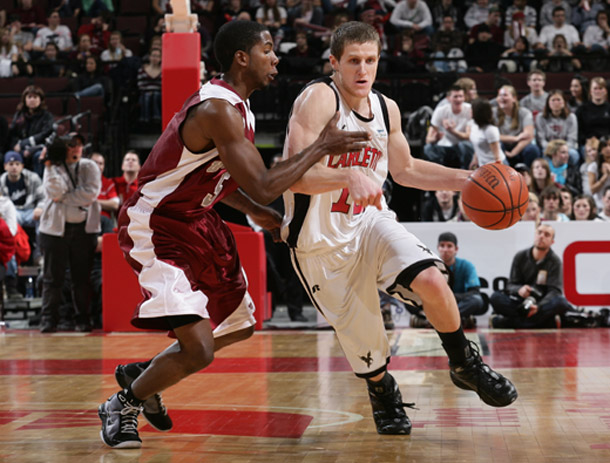Sprott alum Stuart Turnbull reflects on basketball, careers and being a mentor

When your basketball team wins four national basketball championships in five years, you learn a thing or two about what it takes to succeed.
Former Ravens guard and Sprott alumnus Stuart Turnbull (BCom/09) says basketball can teach a lot of skills and lessons that are applicable to your career.
“As a basketball player, you develop all these soft skills, like working hard, working as a team, accomplishing a goal,” he said. “The skillsets change from handling clients or executing a search campaign versus shooting or playing defense, but so many of the principles are the same.”
After graduating from Carleton in 2009 with a Bachelor of Commerce in marketing, Stuart chose to stay on the court for a few more years playing basketball professionally in Germany.
With some help from his former Carleton teammate (and fellow Sprott alumnus) Osvaldo Jeanty (BCom/07), who played in Germany after he graduated, Stuart found an agent, a place to stay, and most importantly, a team.
Over three years, he had stints playing with the Rhöndorf Dragons, the UBC Hannover Tigers and the SC Rist-Wedel, while also getting the chance to travel around Europe.
After his final contract finished up, Stuart moved back to Canada in 2012 to find a more traditional job, which he eventually found through the PLAY (Promoting Life-Skills in Aboriginal Youth) Summer Sun Internship.
Drawing on his experience running summer basketball camps for children in his hometown of Kingston, Stuart worked as a community sports director in northern Ontario and developed similar programs for Aboriginal youth of the Kitchenuhmaykoosib Inninuwug First Nation.
After the summer program ended, Stuart went back to the drawing board to plan the next step in his career.
Digital marketing was a field that drew his interest, dating back to his university days when he worked as a research assistant with professor Leighann Neilson, analyzing and comparing the winery websites in Ontario and around the world.
A few months later in January 2013, he joined Catalyst Canada, a digital marketing agency in downtown Toronto, where he continues working today.
As an account manager, Stuart works on multiple digital marketing aspects for the agency’s clients, including website analysis, search, social and display ads, and search engine optimization.

Despite living and working in Toronto, Stuart stays connected with Carleton through a mentorship program he and his former teammates organized that pairs current Ravens players with former ones.
The programs exists in part to help the younger players manage the transition from university to the working world, something Stuart said he and his teammates found challenging.
“Everybody goes through it,” he said “If you’re not a doctor or a lawyer and you’re not on a very defined career path, things can get pretty murky when you come out of school.”
As mentors, Stuart and other former Ravens help the players with fine tuning their resumes, pointing out what skills they should develop, and securing informational interviews with companies.
“We just want to be the oil in the car for them,” he said. “They’ve got to be the engine, but we want to help the process.”
To do that, Stuart and the other mentors try to show the current players how they can use the culture of Carleton basketball as a guide for developing their careers.
“We weren’t really playing just be great at basketball or to win games,” he said. “It was more about the process of trying to be as perfect as we could be and holding each other to that standard.”
“We knew if we strove to play that way, we could win.”
Using that attitude, of focusing on the process and doing the little things right, is something Stuart believes can take a person a long way in their career.
Looking back on his university career, Stuart said becoming a mentor has made him reflect on a favourite saying of basketball coach Dave Smart.
“Something Dave would always say is: ‘There are if people and when people.’”
“With an ‘if’ person, the big question is if they’re ever going to get it,” he said. “A ‘when’ person is someone you know is going to get it and they’re going to be great, it’s just a matter of how long until that happens.”
Now, as a mentor and a manager at work, Stuart tries to develop “when” people, both on and off the court.